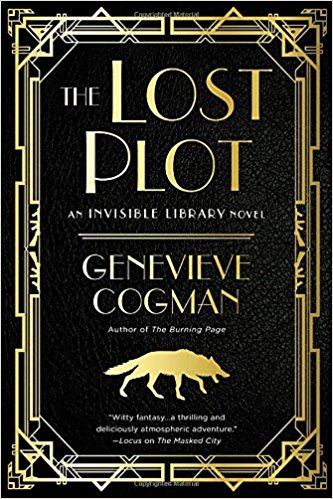 The Lost Plot (The Invisible Library #4) by Genevieve Cogman
The Lost Plot (The Invisible Library #4) by Genevieve Cogman Formats available: paperback, ebook, audiobook
Series: Invisible Library #4
Pages: 367
Published by Ace Books on January 9th 2018
Purchasing Info: Author's Website, Publisher's Website, Amazon, Barnes & Noble, Kobo, Bookshop.org
Goodreads
After being commissioned to find a rare book, Librarian Irene and her assistant, Kai, head to Prohibition-era New York and are thrust into the middle of a political fight with dragons, mobsters, and Fae.
In a 1920s-esque New York, Prohibition is in force; fedoras, flapper dresses, and tommy guns are in fashion: and intrigue is afoot. Intrepid Librarians Irene and Kai find themselves caught in the middle of a dragon political contest. It seems a young Librarian has become tangled in this conflict, and if they can't extricate him, there could be serious repercussions for the mysterious Library. And, as the balance of power across mighty factions hangs in the balance, this could even trigger war.
Irene and Kai are locked in a race against time (and dragons) to procure a rare book. They'll face gangsters, blackmail, and the Library's own Internal Affairs department. And if it doesn't end well, it could have dire consequences on Irene's job. And, incidentally, on her life...
My Review:
 Like the rest of the Invisible Library series (start with the first book, The Invisible Library, and settle in for a marvelously good time!) The Lost Plot has a strong flavor of the old movie serial “The Perils of Pauline”. I would say “out of the frying pan and into the fire” but that phrase just isn’t sufficient to describe Librarian Irene Winters’ many (many, many) hair-raising adventures.
Like the rest of the Invisible Library series (start with the first book, The Invisible Library, and settle in for a marvelously good time!) The Lost Plot has a strong flavor of the old movie serial “The Perils of Pauline”. I would say “out of the frying pan and into the fire” but that phrase just isn’t sufficient to describe Librarian Irene Winters’ many (many, many) hair-raising adventures.
Either those frying pans are bubbling on top of an institutional sized range, with frying pans as far as the eye can see, or it’s an endless stack of frying pans on fires, getting progressively hotter as they go, all the way down.
Irene gets in trouble a lot. To put it another way, Irene has lots of adventures, in the sense that adventure is defined as something that happens to someone else, either long ago, far away, or both. I’d love to have a drink with her, but I wouldn’t want to be her.
In this particular entry in the series, Irene starts out attempting to carry out a simple retrieval mission for the Library. For once, she’s even planning to conduct it above board – buying the book the Library wants rather than just stealing it. This was her first mistake, but certainly not her last.
Irene’s last mistake is undoubtedly going to either be fatal or see her as the head of the Invisible Library – possibly both. But not yet. Nowhere near yet.
This time, Irene finds herself stuck in the middle of dragon politics, a situation that up until now she has carefully tried to avoid at all costs. But this time, as is usual for Irene, even though she doesn’t go looking for trouble, it inevitably finds her.
Getting involved in dragon politics might get her killed. And that might be the least bad of the many available possibilities. It’s almost certainly going to cost her relationship with her apprentice Kai. A relationship that Irene has attempted to keep as loosely defined as possible, because she doesn’t want to lose Kai in her life in any capacity, even though Kai is himself a dragon.
More dangerous all around is the possibility that in the fallout from this ever-growing clusterf**k, the Library will lose its not merely prized but absolutely vital neutrality in the endless conflict between the dragons and the fae, who respectively represent order and chaos. Because its only in the middle ground between those two vast forces that human beings can thrive. If the Library loses its neutrality through thoughtless political machinations (or Irene’s inability to counter those machinations) there’s not much hope left.
The needs of the many, as always, outweigh the needs of the view, or of the one. And it’s up to Irene to find a way to meet those needs, no matter what the cost is to herself.
Again.
Escape Rating A: I used the Star Trek paraphrase for multiple reasons. Irene is always at the sharp end of the spear, in danger of losing something (or many somethings) that she holds dear in order to preserve the balance. She’s always in a “mission impossible” situation, where the Library will cut her loose and disavow any knowledge of her actions if things go wrong.
But it’s the setting of this particular entry that really made me think of Star Trek. The alternate world in which Irene finds herself this time is an over-the-top version of America during Prohibition, complete with goons with “tommy guns” on every corner. I couldn’t help but be reminded of the Original Series episode A Piece of the Action, which has a similar setting.
One of the interesting things about this series as a whole is the way that it has eschewed the traditional conflict between good and evil for the much more interesting and nuanced balancing act between order and chaos. This is the same battle that played out in Babylon 5, and illustrates yet again that neither of those forces are good or evil per se, but that extremes of both are bad for humanity.
Irene is as intrepid a heroine as ever, always running and dancing as fast as she can to stay a half step ahead of the doom that is inevitably following her. I absolutely love all of her adventures and can’t wait for more.
Reviewer’s Note: I loved this book, but it is difficult for me to review. It is one of the books that I read at my mother’s bedside while she was in hospice. I needed something that would take me mentally away from the circumstances but still leave me reasonably present for the inevitable. I got lost in The Lost Plot and it proved to be a perfect distraction.

 The Guns Above by
The Guns Above by 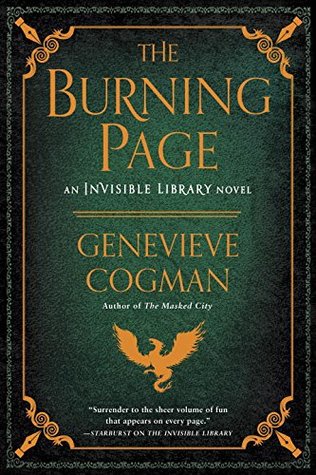 The Burning Page (The Invisible Library, #3) by
The Burning Page (The Invisible Library, #3) by 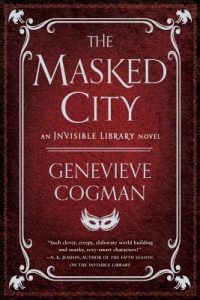 Irene, on probation after the events in
Irene, on probation after the events in  Personally, I think she’s finally figured out that a good job won’t love you back, but we’ll see how that turns out in future books.
Personally, I think she’s finally figured out that a good job won’t love you back, but we’ll see how that turns out in future books. The Liberation (The Alchemy Wars, #3) by
The Liberation (The Alchemy Wars, #3) by  In my review of the first book in the trilogy,
In my review of the first book in the trilogy, 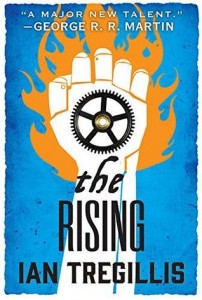 Escape Rating A-:
Escape Rating A-: 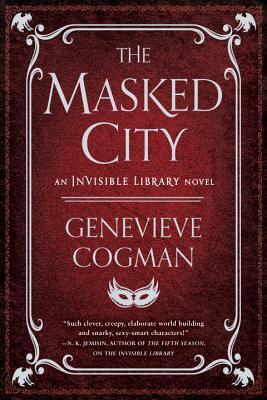 The Masked City (The Invisible Library, #2) by
The Masked City (The Invisible Library, #2) by  As it is here for Irene. She finds herself being challenged at every turn, as each faction tries to sweep her into their narrative and out of her own. Only her bond with the Library keeps her from sinking. But in the end, she is forced to create stories that will sweep others into her wake, in order to prevent the upcoming Armageddon. I can’t wait to see what kind of trouble finds Irene (and Kai) next in
As it is here for Irene. She finds herself being challenged at every turn, as each faction tries to sweep her into their narrative and out of her own. Only her bond with the Library keeps her from sinking. But in the end, she is forced to create stories that will sweep others into her wake, in order to prevent the upcoming Armageddon. I can’t wait to see what kind of trouble finds Irene (and Kai) next in 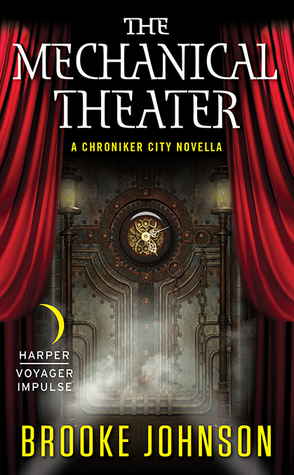 The Mechanical Theater by
The Mechanical Theater by 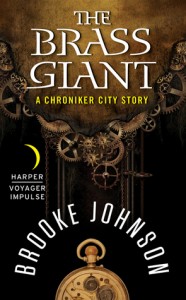 I finally picked The Mechanical Theater out of my towering TBR pile because I liked the first full-length novel in the
I finally picked The Mechanical Theater out of my towering TBR pile because I liked the first full-length novel in the  The “mechanicals” of the Mechanical Theater are also not a big part of the story. So this is steampunk for those who are not necessarily fascinated with the trappings of steampunk. All in all, a bit of an introduction both to the genre and to this world. I’m looking forward to more in The Guild Conspiracy.
The “mechanicals” of the Mechanical Theater are also not a big part of the story. So this is steampunk for those who are not necessarily fascinated with the trappings of steampunk. All in all, a bit of an introduction both to the genre and to this world. I’m looking forward to more in The Guild Conspiracy. The Invisible Library (The Invisible Library #1) by
The Invisible Library (The Invisible Library #1) by 
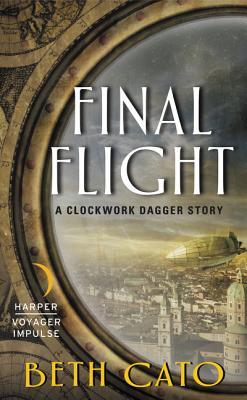 Final Flight (Clockwork Dagger, #2.6) by
Final Flight (Clockwork Dagger, #2.6) by 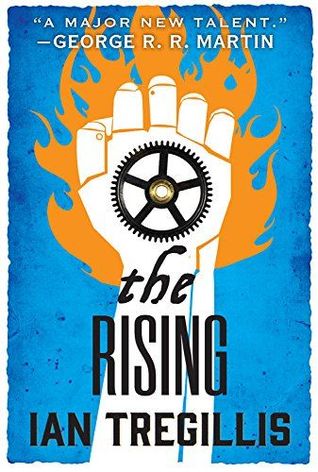 The Rising (The Alchemy Wars, #2) by
The Rising (The Alchemy Wars, #2) by 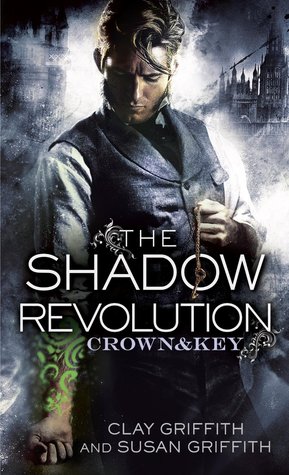 The Shadow Revolution (Crown & Key, #1) by
The Shadow Revolution (Crown & Key, #1) by 